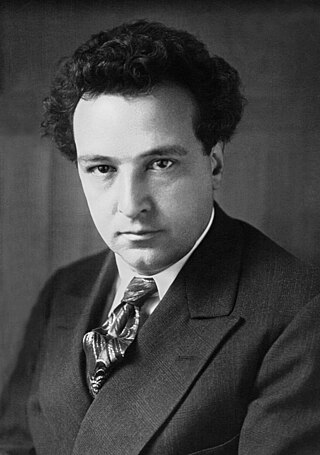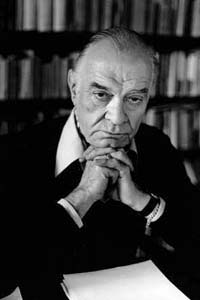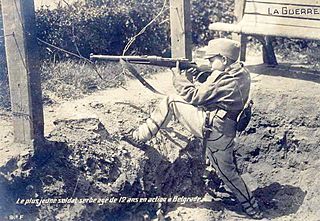Related Research Articles

Arthur Honegger was a Swiss composer who was born in France and lived a large part of his life in Paris. Honegger was a member of Les Six. For Halbreich, Jeanne d'Arc au bûcher is "more even than Le Roi David or Pacific 231, his most universally popular work".

Léo Ferré was a French-born Monégasque poet and composer, and a dynamic and controversial live performer. He released some forty albums over this period, composing the music and the majority of the lyrics. He released many hit singles, particularly between 1960 and the mid-1970s. Some of his songs have become classics of the French chanson repertoire, including "Avec le temps", "C'est extra", "Jolie Môme" and "Paris-Canaille".
Paul Nougé was a Belgian poet, founder and theoretician of surrealism in Belgium, sometimes known as the "Belgian Breton".

Antoine Fabre d'Olivet was a French author, poet and composer whose Biblical and philosophical hermeneutics influenced many occultists, such as Eliphas Lévi, Gérard Encausse ("Papus") and Édouard Schuré.

Jean Borella is a Christian philosopher and theologian. Borella's works are inspired by Ancient and Christian Neoplatonism, but also by the Traditionalist School of René Guénon and Frithjof Schuon.

Denys Louis de Rougemont, known as Denis de Rougemont, was a Swiss writer and cultural theorist who wrote in French. One of the non-conformists of the 1930s, he addressed the perils of totalitarianism from a Christian point of view. After the Second World War, he promoted European federalism.

Noël Mathieu better known under his pseudonym Pierre Emmanuel, was a French poet of Christian inspiration.
Jeanlouis Cornuz was a Swiss writer.
Éric Werner is a Swiss philosopher, journalist and essayist.
Émile Poulat, was until 1954 a Catholic priest, associated with the Prêtres Ouvriers movement, and thereafter a French historian and sociologist. Director of Studies at the École des hautes études en sciences sociales, he was also director of research at CNRS and historian of the contemporary church. He was a founding member of the Group of Sociology of Religion, director and member of the editorial boards of several journals including Politica Hermetica. His research concentrated on the conflict between Catholic culture and modern culture in the history of contemporary Catholicism.

Colette Renard, born Colette Lucie Raget, was a French actress and singer. Renard is closely associated with the titular character from the musical Irma La Douce, a role she played for over a decade.
Jean-François Fournier is a writer, playwright, poet and biographer Vaud.
Gustave Roud was a French-speaking Swiss poet and photographer.

Dragoljub Jeličić was one of the youngest soldiers in the Royal Serbian Army during the First World War.

Paul-Gilbert Langevin was a French musicologist, who was a specialist on Anton Bruckner, Franz Schubert and 19th-century classical music.
Laurent Gagnebin is a philosopher and Protestant theologian born in Lausanne in 1939. He has been pastor of the Reformed Church of France in Paris in the Liberal Protestant congregations of the Oratory of the Louvre and the Temple protestant du Foyer de l'Âme from 1963 to 1981 and professor of practical theology at the Protestant Faculty of Theology in Paris.
Louise Anne Bouchard, originally from Quebec, is an author, screenwriter and photographer, of Canadian and Swiss citizenship. Her first novel was Cette fois, Jeanne... (1987).
Jean-Luc Caron is a French physician and musicologist.

Jacques Viret is a contemporary French musicologist of Swiss origin.

Requiem is a setting of the Latin Mass for the dead for four soloists, mixed choir, orchestra and organ by Frank Martin. Composed in 1971 and 1972, it was premiered at Lausanne Cathedral on 4 May 1973, with the composer conducting the Orchestre de la Suisse Romande. It has been described as the composer's masterpiece.